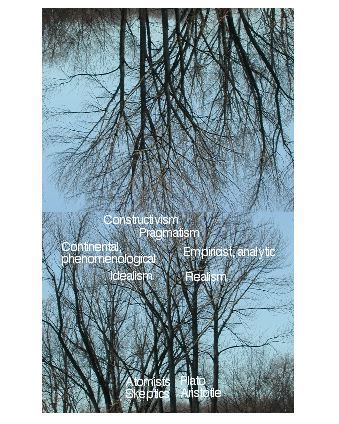Philosophy 310=Biology 310
Bryn Mawr College
Spring, 2005
29 March
Re-Thinking Philosophy of Science?
I. Darwin (et al) as a starting point http://serendipstudio.org/sci_cult/philsci/s05/29march.html
Our conversation so far ...
- Popper vs Kuhn
- Realism vs constructivism - is there a world out there? if so, what is its character? can we know it? how? ... metaphysics vs epistemology ... validity of a correspondence theory of truth; issue of imputationalism (Berkeleyan "idealism")
- Singularism vs multiplism - there could be a world out there that doesn't admit of a single interpretation ... or even be "inchoate" in absence of intepretation?
- Realism vs idealism - Plato/Popper as "idealists"? origin/"usefulness" of "ideals"?
- Intensional vs extensional ... properties of things? or characteristics of relationships?
- Non-intentionality vs intentionality ... objectivity vs subjectivity ... abstract truth vs "usefulness"
- Coordinate frames, conceptual frameworks ... existence, ability to transcend, existence of (necessity for) "transcendental", short turn, long run, eternal?
- Form versus content
- Trees and translatability

Philosophy as context dependent, looking at things in a particular conceptual framework ... can it transcend? (short run)
"Philosophy is its own time raised to the level of thought" ... Hegel, Elements of the Philosophy of Right, 1821
If earlier abstract thought was interested in the principle only as content, but in the course of philosophical development has been impelled to pay attention to the other side, to the behaviour of the cognitive process, this implies that the subjective act has also been grasped as an essential moment of objective truth, and this brings with it the need to unite the method with the content, the form with the principle. Thus the principle ought also to be the beginning, and what is the first for thought ought also to be the first in the process of thinking ... Hegel, Science of Logic (paragraph 90), 1815
it [this system of logic] is not something distinct from its object and content; for it is the inwardness of the content, the dialectic which it possesses within itself, which is the mainspring of its advance ... Hegel, Science of Logic (paragraph 63), 1815
Thus the dialectical movement of substance through causality and reciprocity is the immediate genesis of the Notion, the exposition of the process of its becoming ... Hegel, Science of Logic (paragraph 1281), 1815
Granted, then, that empty space extends without limit in every direction and that seeds innumerable are rushing on countless courses through an unfathomable universe ... It is in the highest degree unlikely that this earth and sky is the only one to have been created ... Lucretius, c 99-55 BC
According to Timon, Pyrrho declared that things are equally indifferent, unmeasurable and inarbitrable. For this reason neither our sensations nor our opinions tell us truths or falsehoods ... Aristocles, fragment, c 1st century BC-AD
A strategy for transcendence (short term)?
- Popper/Kuhn/etc largely draw from physics from Copernicus to present
A period of success in transcending coordinate frames but raises as questions
- is there a truly transcendent coordinate frame?
- is there a sustainable observer/object distinction?
- is there an "out there" that has properties independent of the observer?
- Would philosophy of science be different, yield different issues if it reflected different science/period?
An alternative science/period: Darwin (1860) and following
(see also Adam Smith, 1723-1790, Thomas Malthus, 1766-1834, Charles Lyell, 1797-1875)
Daniel Dennett, Darwin's Dangerous Idea, Chapters 1-3
- transition from essentialist to non-essentialist characterization of kinds of living things
- fundamental historical character to "explanation"
- continuity of inanimate/animate, matter/spirit, non--intentionality/intentionality
- absence of blueprint/conductor
- randomness plus differential survival
- in biological world at least, no Truth?, no Reality? only ongoing change?
- origin of purpose, meaning in the brain, crane or skyhook?
Your thoughts? Welcome in course forum area.
| Course Forum | Course Home Page |
| Science in Culture
| Serendip Home |
Send us your comments at Serendip

© by Serendip 1994-
- Last Modified:
Wednesday, 02-May-2018 11:57:09 CDT
